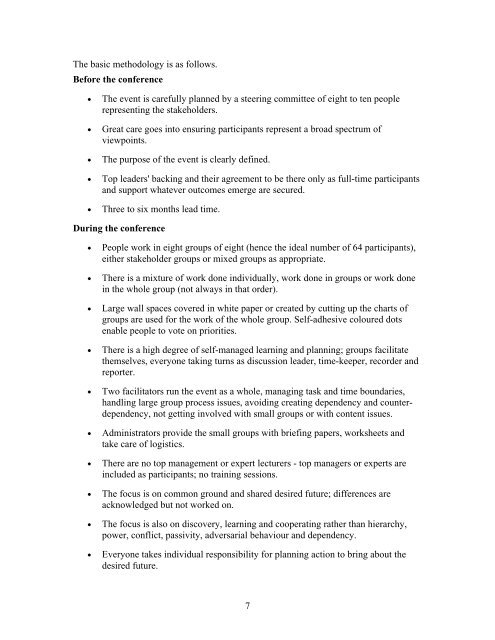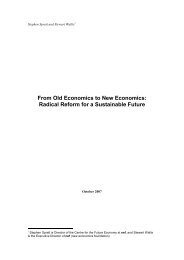Creating the futures we desire - getting the whole ... - Bruce Nixon
Creating the futures we desire - getting the whole ... - Bruce Nixon
Creating the futures we desire - getting the whole ... - Bruce Nixon
You also want an ePaper? Increase the reach of your titles
YUMPU automatically turns print PDFs into web optimized ePapers that Google loves.
The basic methodology is as follows.<br />
Before <strong>the</strong> conference<br />
• The event is carefully planned by a steering committee of eight to ten people<br />
representing <strong>the</strong> stakeholders.<br />
• Great care goes into ensuring participants represent a broad spectrum of<br />
viewpoints.<br />
• The purpose of <strong>the</strong> event is clearly defined.<br />
• Top leaders' backing and <strong>the</strong>ir agreement to be <strong>the</strong>re only as full-time participants<br />
and support whatever outcomes emerge are secured.<br />
• Three to six months lead time.<br />
During <strong>the</strong> conference<br />
• People work in eight groups of eight (hence <strong>the</strong> ideal number of 64 participants),<br />
ei<strong>the</strong>r stakeholder groups or mixed groups as appropriate.<br />
• There is a mixture of work done individually, work done in groups or work done<br />
in <strong>the</strong> <strong>whole</strong> group (not always in that order).<br />
• Large wall spaces covered in white paper or created by cutting up <strong>the</strong> charts of<br />
groups are used for <strong>the</strong> work of <strong>the</strong> <strong>whole</strong> group. Self-adhesive coloured dots<br />
enable people to vote on priorities.<br />
• There is a high degree of self-managed learning and planning; groups facilitate<br />
<strong>the</strong>mselves, everyone taking turns as discussion leader, time-keeper, recorder and<br />
reporter.<br />
• Two facilitators run <strong>the</strong> event as a <strong>whole</strong>, managing task and time boundaries,<br />
handling large group process issues, avoiding creating dependency and counterdependency,<br />
not <strong>getting</strong> involved with small groups or with content issues.<br />
• Administrators provide <strong>the</strong> small groups with briefing papers, worksheets and<br />
take care of logistics.<br />
• There are no top management or expert lecturers - top managers or experts are<br />
included as participants; no training sessions.<br />
• The focus is on common ground and shared <strong>desire</strong>d future; differences are<br />
acknowledged but not worked on.<br />
• The focus is also on discovery, learning and cooperating ra<strong>the</strong>r than hierarchy,<br />
po<strong>we</strong>r, conflict, passivity, adversarial behaviour and dependency.<br />
• Everyone takes individual responsibility for planning action to bring about <strong>the</strong><br />
<strong>desire</strong>d future.<br />
7



